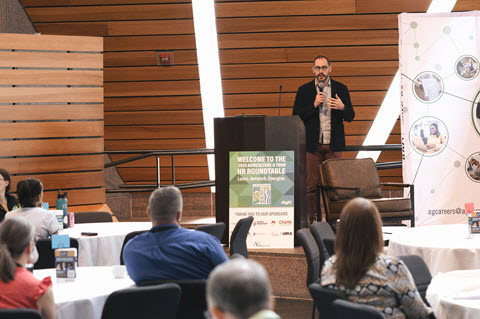At the 2024 AgCareers Agriculture & Food Roundtable, Derek Mulhern, Executive Life & Leadership Coach, stated that performance management is not static but constantly changing and evolving. It drives organizational success and your company's organizational culture. “Performance management is the systematic approach to defining goals, appraising progress, and offering consistent coaching and feedback.” Right away, Derek got the audience's attention.
He began to talk about the traditional vs new approach to performance management. Finding new ways to be nimble and help employees develop and grow was important.
Traditionally, we know that KPIs (Key Performance Indicators) measure and track an organization’s ongoing processes and performance metrics. KPIs are quantifiable statements that can be used to set numerical targets, analyze past performance, and predict the future. They can be helpful in more quantifiable goals, such as average contract value, conversion rate, and average ticket resolution time.
The conversation changed from measurements by number to measurements of individual achievement. I was not familiar with the acronym OKR, Outcome Key Results. Derek explained these measurements help define and outline what an organization needs to achieve and how to achieve it within a given time. OKRs are a goal-setting framework that can be used to set any goal, but companies often use them for bolder, more aggressive goals. OKRs can help organizations improve their current state and stretch their goals further, allowing for more creativity in reaching them. OKRs look at measurement holistically, reviewing how employees see themselves in the organization. Derek reminded us that OKRs don’t replace KPIs but can help your team achieve them. OKRs are agile and team-based, allow alignment and engagement, and are motivating when used.
Derek then talked about feedback, performance reviews, and one-on-one meetings. He provided us with some stats from Quantum Workplace that stated 71% of employees preferred immediate feedback, even if it was negative. He shared that 90% of performance reviews are painful for employees and often ineffective. Derek also found that performance reviews are a manager’s most hated task, second to firing someone. A key takeaway was that one-on-one meetings should be the managers' most important meeting of the week. One-on-one meetings allow managers to be good coaches, ask questions, and listen. To share and receive feedback. It is also time to set actionable next steps if needed. It is a time for reviewing how people have felt during their tasks, not about task updates. Task updates should be provided in writing via email.
Derek asked us to think about our barriers to providing feedback. These are remarkably similar barriers to the one Jonathan Shaver spoke about, the lack of confidence that employees can have. Derek’s list included lack of trust, infrequent connections, back channeling and drama, judgement, embarrassment, guilt, humiliation, and shame. We were given guidance on being curious versus being right. He quoted Brene Brown “Clear is kind. Unclear is unkind.” And that managers and leaders need to practice vulnerability and empathy.
Derek then shared strategies to deliver feedback effectively. A foundation he provided was the Feedback Model. He guided us to include a description of the situation, including place, time, and circumstances, describing what was observed. Followed by the specific results of the behavior, ending with what changes need to be made. He encouraged us to coach instead of evaluate, be careful with language during our conversations, and remain focused on solutions. He also made us think about how we reward employees with positive feedback. Are we doing it in a way that the employee appreciates? Are we rewarding achievements and behaviors? Derek offered that we consider learning who likes public recognition, who values mass recognition, and whether there are specific individual ways that we can reward employees.
Derek’s closed out by discussing mentoring, coaching and traditional management methods. He highlighted the benefits of coaching as it focuses on individual growth, empowerment, listening and inquiries, collaboration, and strength-based skills. Coaching employees leads to higher job satisfaction, enhanced leadership, increased engagement, and increased employee retention.
“Effective performance management ensures employees at all levels within a company achieve individual targets and contribute effectively to their company's goals.”
Derek’s presentation was informative and clear. I felt inspired to try new approaches with my team and to adjust my own mindset around my one-on-one meetings.



